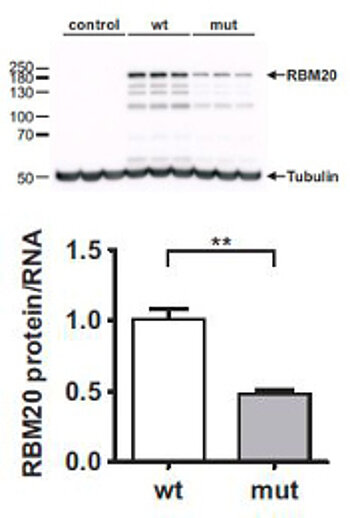RBM20 as a diagnostic marker for cardiovascular diseases
Challenge
Cardiovascular diseases are a major cause of death although considerable financial resources are devoted to both research and therapy. In addition to environmental influences, genetic factors strongly determine a patient's risk for heart disease such as cardiomyopathies and sudden cardiac death. Dilated cardiomyopathy (DCM) is a leading cause for heart failure and cardiac transplantation in Western countries. Patient-specific determination of risk factors indicating potential development of cardiac diseases is therefore of major importance to improve individual health care, ideally tailor down treatment according to the patient´s individual risk profile and importantly to reduce worldwide therapy costs. For solid risk assessment, markers directly and indirectly related to cardiac function as well as their upstream modulators should be addressed.
Technology
The technology relates to the human RNA binding motif protein RBM20 as a prognostic and diagnostic marker for cardiomyopathies and sudden cardiac death. In particular, the mutation P638L was associated with autosomal dominant DCM and sudden cardiac death, suggesting a relation of RBM20 gene mutations and cardiovascular diseases. RBM20 acts as a splicing regulator of diverse cardiac genes related to contractile function and disease. Thus, it is not only a suitable diagnostic and therapeutic marker, but could furthermore serve as a control for a larger panel of genes involved in cardiac disease.
Commercial Opportunity
In-licensing for the development of diagnostic tools; collaboration opportunity.
Development Status
Change in the RBM20 gene has been identified in a rat model and in patients with DCM and sudden death. Expression of a P638L mutant RBM20 protein transfected into HEK 932 cells reveals a decreased protein/mRNA ratio and an overall reduced RBM20 expression, indicative of reduced protein stability.
Patent Situation
PCT application filed in 2010 (WO2010149332), pending in EP (EP2446059) and US (US2012-0277282).
Further Reading
Guo W. et al., RBM20, a gene for hereditary cardiomyopathy, regulates titin splicing, Nat Med. 2012 May;18(5):766-73, doi: 10.1038/nm.2693





